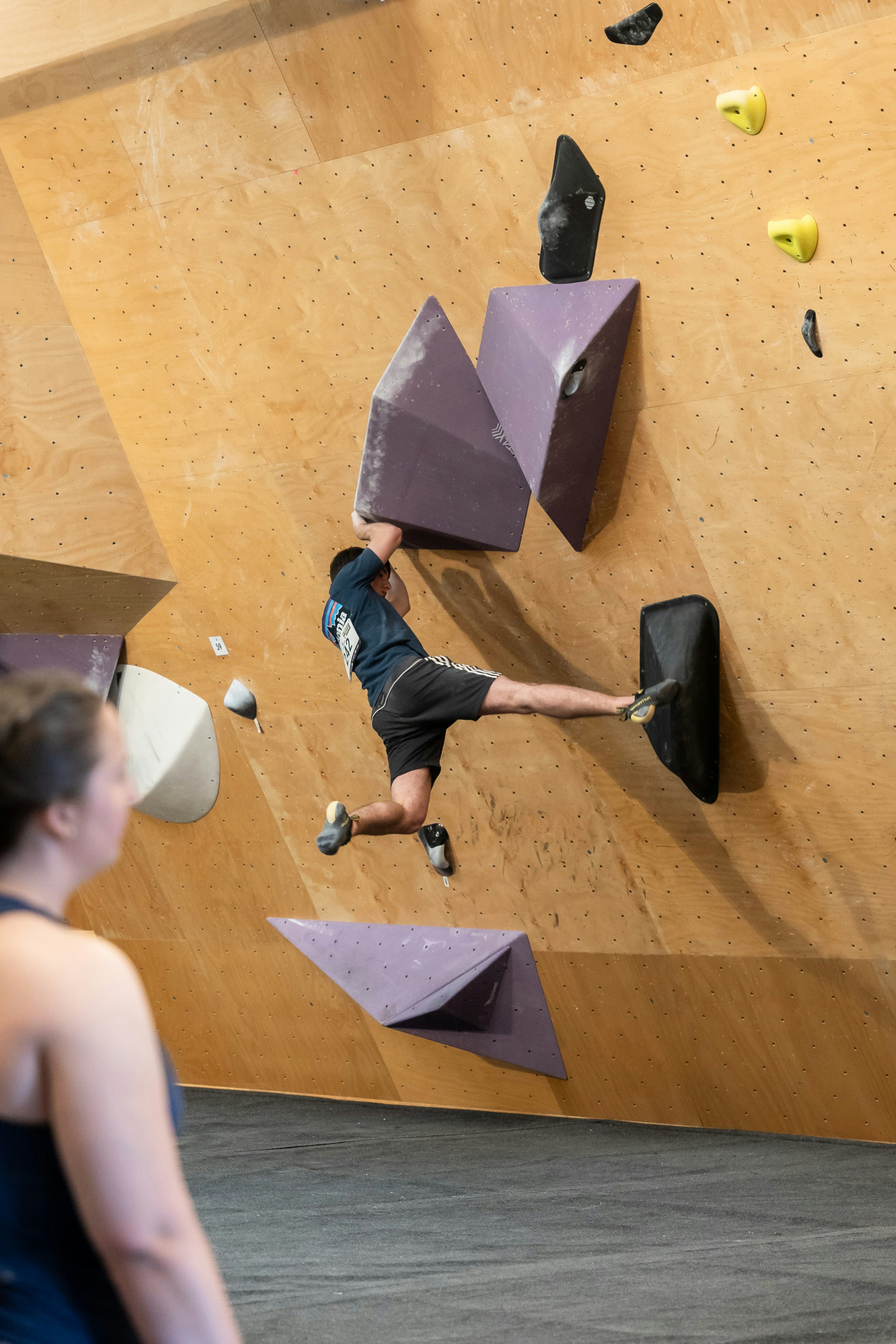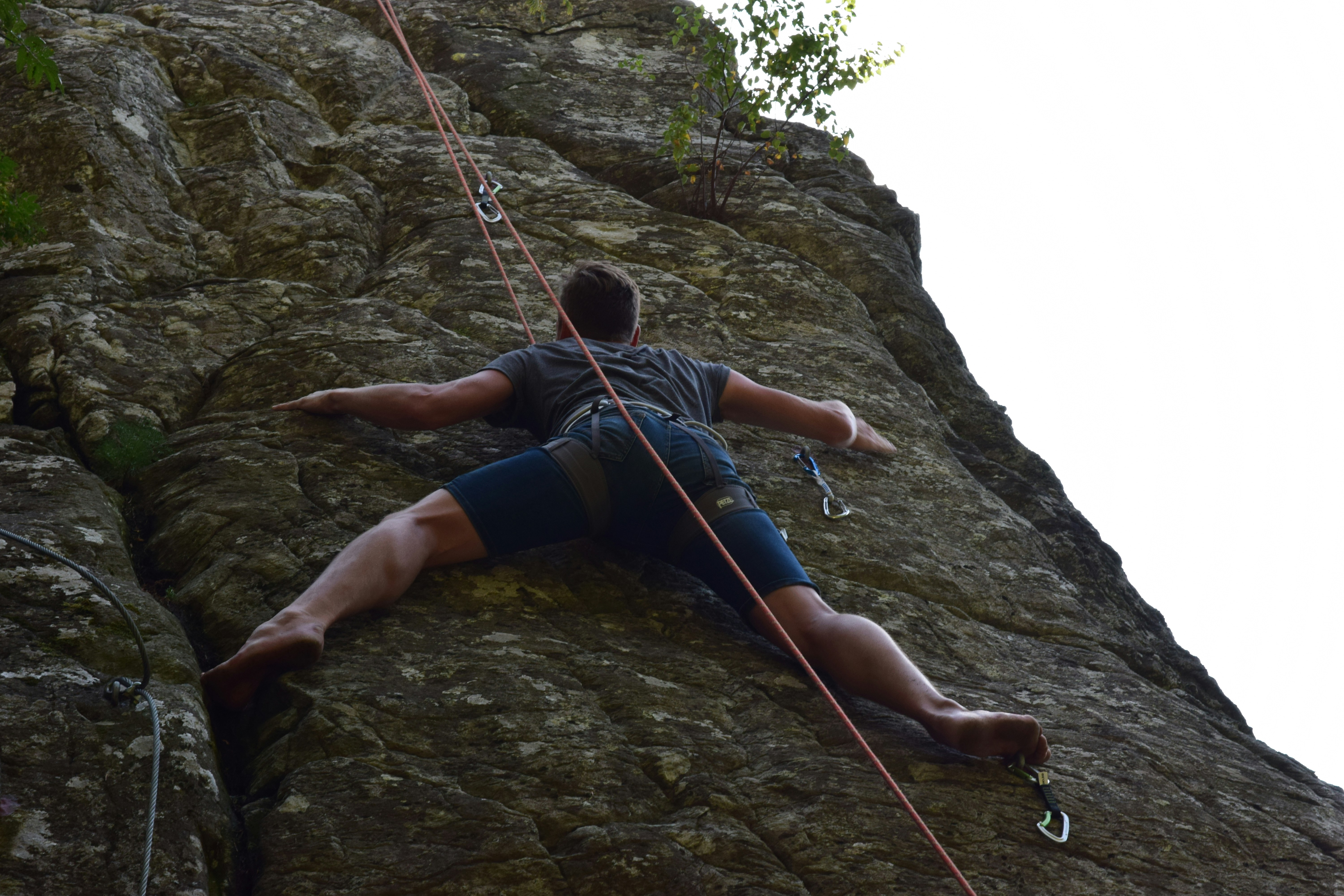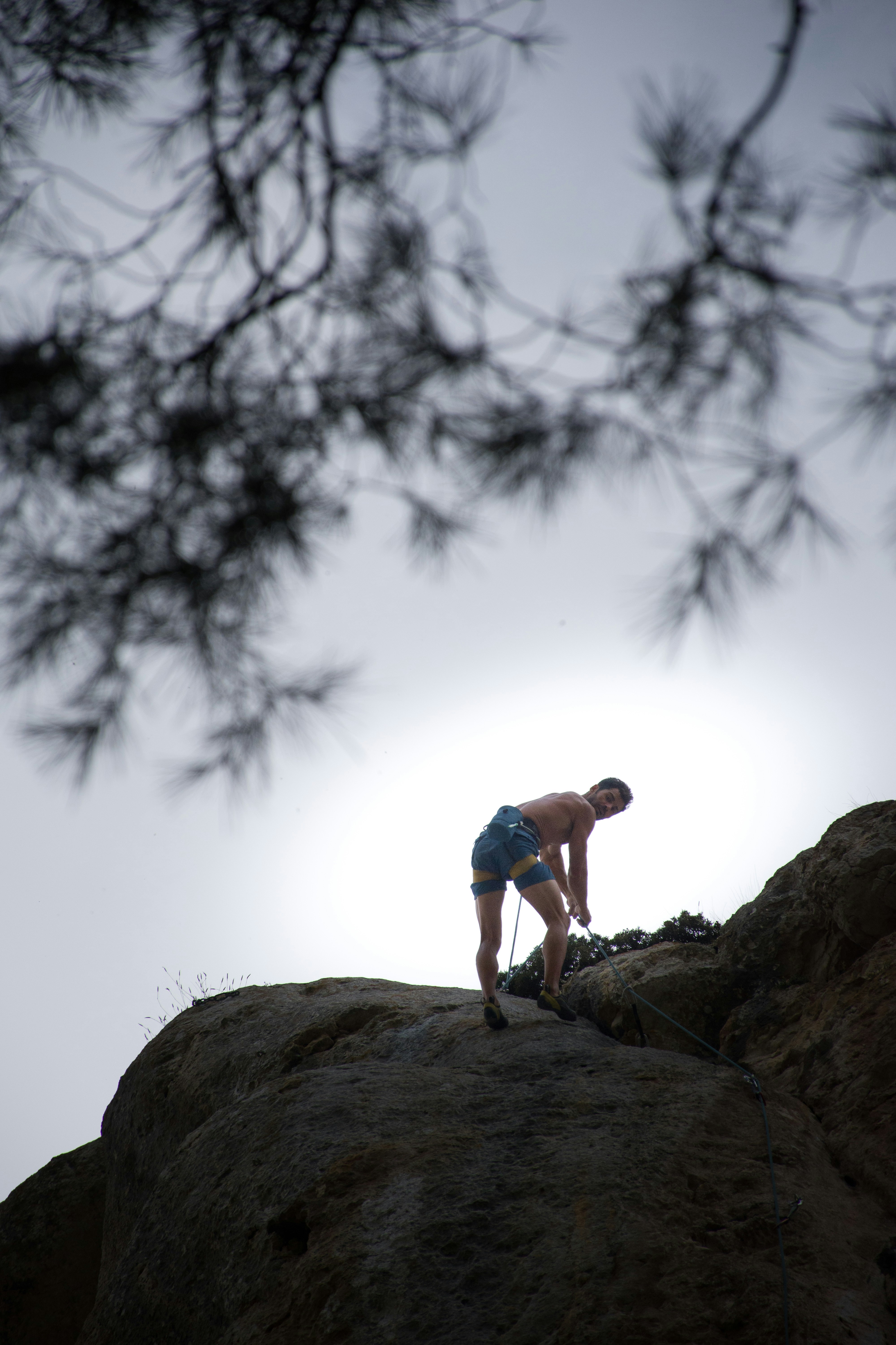With the 2025 IFSC Climbing World Championships in Seoul happening right now - today marks boulder qualification day - we're witnessing the culmination of months of meticulous preparation. Janja Garnbret, Adam Ondra, and dozens of other elite athletes have been working toward this single week since the last World Championships, and their approach to peaking for major competitions offers valuable lessons for climbers at every level.
The difference between a good competition performance and a great one often comes down to the details that happen weeks and months before you ever touch the competition wall. Elite climbers understand that peak performance isn't about being strong all the time - it's about being your strongest, most focused, and most confident when it matters most.
Whether you're preparing for your first local competition or dreaming of representing your country on the world stage, the principles that guide championship-level preparation can transform how you approach your biggest climbing goals. Let's dive into the systematic strategies that separate consistent competitors from occasional participants.
The Periodization Approach: Building Toward Your Peak
Elite climbers don't train at maximum intensity year-round. Instead, they use periodization - the systematic planning of athletic training that involves progressive cycling of various aspects of training during specific periods. This approach recognizes that your body and mind can only maintain peak performance for limited windows.
The typical championship preparation cycle begins 16-20 weeks out from the competition date. The first phase focuses on building a broad base of strength, endurance, and movement skills. During this foundation phase, climbers spend significant time working weaknesses, developing new techniques, and building the physical capacity that will support later training intensities.
You might see an elite boulderer spending hours on endurance routes during base training, not because they'll need that specific fitness in competition, but because it builds the aerobic capacity that supports recovery between high-intensity efforts. Similarly, a lead specialist might dedicate sessions to pure power training, developing the explosive capabilities that can make the difference on crux sequences.
The beauty of this approach is that it works at every level. A local gym competitor preparing for their regional championships can apply the same principles by planning backwards from their competition date. Start with general climbing fitness, gradually shift toward competition-specific preparation, and time your peak to coincide with the event that matters most to you.
The middle phase shifts focus toward competition-specific preparation. This is where you see elite climbers start practicing their discipline-specific skills more intensively. Boulderers begin focusing more on powerful, dynamic movements and complex coordination sequences. Lead climbers emphasize sustained difficulty climbing and mental management of longer routes. Speed climbers dial in their technique and work on reaction time.
Mental Preparation: The Hidden Advantage
Physical preparation gets most of the attention, but mental preparation often determines who performs when the pressure is highest. Elite climbers develop detailed mental training protocols that are every bit as systematic as their physical training.
Visualization plays a crucial role in this preparation. World Championship competitors don't just imagine climbing well - they practice specific scenarios they might encounter in Seoul. They visualize dealing with holds they've never seen before, managing the pressure of a packed arena, and executing their optimal performance routine even when things don't go according to plan.
The most successful competitors develop what sports psychologists call "process focus" - the ability to concentrate on executing their technique and tactics rather than getting caught up in results or external pressures. During training, they practice this focus by creating artificial pressure situations and learning to climb well despite distractions.
Recovery and stress management become increasingly important as competition approaches. Elite climbers often work with sports psychologists to develop personalized strategies for managing competition anxiety, maintaining confidence after setbacks, and staying focused during long competition days.
You can apply these mental training principles to your own competition preparation. Practice climbing while people are watching. Deliberately attempt problems or routes when you're tired or stressed. Develop a pre-climb routine that helps you focus, and practice that routine consistently during training. Most importantly, learn to embrace nervous energy rather than fighting it - those butterflies mean you care, and with practice, you can channel that energy into better performance.
Technical Refinement: Perfecting Movement Patterns
As major competitions approach, elite climbers shift their technical focus toward perfection rather than acquisition. They're not trying to learn new movement patterns at this stage - they're refining and strengthening the techniques they'll rely on under pressure.
This refinement process involves breaking down complex movements into components and practicing each element until it becomes automatic. A lead climber might spend an entire session working on their clipping efficiency, practicing the motion until they can clip quickly and smoothly without thinking about the mechanics. A boulderer might drill specific coordination sequences, repeating complex moves until the pattern is burned into muscle memory.
Video analysis becomes increasingly important during this phase. Elite climbers and their coaches review footage of training sessions, identifying subtle inefficiencies in movement or technique flaws that only become apparent under close examination. They pay particular attention to how their technique holds up when they're tired or stressed, since those are the conditions they'll face during competition.
The timing of technical work is crucial. Major technical changes happen during the base training phase, while the competition preparation phase focuses on refinement and consistency. Trying to make significant technical adjustments close to a major competition is a recipe for disaster - athletes need time to integrate new movement patterns before they can execute them reliably under pressure.
Tactical Training: Reading and Executing Under Pressure
Competition climbing isn't just about physical ability - it's about making smart tactical decisions under pressure. Elite climbers spend significant time developing their ability to read routes and problems quickly and accurately, then execute their planned sequences even when the pressure is intense.
Route reading practice becomes increasingly sport-specific as competitions approach. Boulderers practice analyzing complex problems in limited time, developing pattern recognition that allows them to quickly identify key sequences and rest positions. Lead climbers work on managing their energy and attention over longer routes, learning to identify crucial decision points and plan their efforts accordingly.
The most successful competitors develop multiple tactical approaches for different scenarios. They have a plan A for when everything goes well, but they also have plans B and C for when holds don't work as expected or when they find themselves in different physical or mental states than anticipated. This tactical flexibility often separates podium finishers from the rest of the field.
Simulation training plays a crucial role in tactical preparation. Elite climbers create training scenarios that mimic competition conditions as closely as possible. They practice with time limits, artificial pressure, and unfamiliar route styles. Some even travel to train at different gyms specifically to practice adapting to new setting styles and hold types.
The Seoul World Championships are showcasing the importance of tactical preparation right now. The competition format, with its isolation periods and limited preview time, is rewarding athletes who can quickly analyze problems and routes, develop effective strategies, and execute those strategies under intense pressure.
Recovery and Tapering: Timing Your Peak
One of the most challenging aspects of competition preparation is learning when to push and when to back off. Elite climbers understand that peak performance requires being fresh and recovered when competition day arrives, which means carefully managing training loads in the weeks leading up to major events.
The tapering phase typically begins 2-3 weeks before a major competition. Training volume decreases significantly, but intensity may remain high during carefully planned sessions. The goal is to maintain fitness and sharpness while allowing the body to recover fully from the cumulative stress of months of preparation.
Sleep becomes increasingly prioritized during this phase. Elite climbers often work with sleep specialists to optimize their rest and recovery. They pay attention to sleep hygiene, maintain consistent sleep schedules, and address any factors that might interfere with quality rest. During Seoul this week, competitors are prioritizing 8-9 hours of quality sleep per night to maintain peak performance throughout the championships.
Nutrition also becomes more precise during the tapering phase. Athletes work with sports nutritionists to develop detailed fueling strategies for competition day, and they practice these strategies during training to ensure they work well. They focus on maintaining stable energy levels, supporting recovery, and avoiding any nutritional experiments that could backfire during competition.
Active recovery becomes the norm during taper weeks. Instead of complete rest days, elite climbers engage in light movement activities that promote blood flow and maintain mobility without adding training stress. Yoga, swimming, easy hiking, or gentle cycling help maintain physical readiness while supporting the recovery process.
Competition Day Execution: Bringing It All Together
All the months of preparation ultimately come down to execution during a few crucial hours of competition. Elite climbers develop detailed competition day routines that help them perform their best when it matters most.
These routines begin well before arriving at the venue. Successful competitors have standardized wake-up times, breakfast choices, and warm-up protocols that they practice during training competitions. They know exactly how their body responds to different warm-up intensities and durations, and they've practiced their pre-competition mental preparation until it becomes automatic.
The ability to adapt these routines when circumstances change separates truly elite competitors from those who struggle under pressure. Weather delays, schedule changes, or unexpected venue conditions can derail athletes who are too rigid in their approach. The most successful competitors build flexibility into their routines while maintaining the core elements that help them perform their best.
During competition, elite climbers rely heavily on process focus. Rather than thinking about results or comparing themselves to other competitors, they concentrate on executing the techniques and tactics they've practiced thousands of times in training. They trust their preparation and focus on the elements within their control.
Learning from Elite Preparation Strategies
You don't need to be heading to Seoul to benefit from championship-level preparation strategies. The principles that guide elite training can be scaled and adapted for competitors at every level, from local gym competitions to regional championships.
Start by identifying your most important competition of the season and plan backwards from that date. Build a training plan that includes a foundation phase, a competition-specific preparation phase, and a tapering phase. Pay as much attention to mental preparation as physical training, developing your ability to perform under pressure and manage competition nerves.
Practice competition-specific skills regularly, not just during the weeks leading up to your event. Work on route reading, time management, and executing your optimal performance routine. Create pressure situations during training and learn to climb well despite distractions or unexpected challenges.
Don't underestimate the importance of recovery and stress management. Elite athletes succeed not because they train harder than everyone else, but because they train smarter. They understand that adaptation happens during rest, not during training, and they prioritize the habits that support high-quality recovery.
Most importantly, remember that peak performance is about being your best when it matters most, not about being perfect all the time. The athletes competing in Seoul this week understand that preparation is about building confidence, managing variables, and positioning themselves to perform their best when the moment arrives.
Whether you're watching the World Championships as inspiration for your own climbing goals or simply appreciating the incredible skill on display, remember that every elite performance represents months of systematic preparation. The climbers competing in Seoul right now didn't just get strong - they got strategic about when and how to be strong.
Your next competition might not be in front of thousands of spectators, but the preparation principles remain the same. Plan systematically, prepare thoroughly, and trust the process when it's time to perform. That's how champions are made, whether in Seoul or at your local gym.
Taking Action: Your Championship Preparation Plan
The 2025 World Championships in Seoul are representing the pinnacle of our sport this week, showcasing what's possible when talent meets systematic preparation. The strategies that are determining podium positions as we speak can guide your own climbing journey, regardless of your current level or competitive aspirations.
Start by committing to a long-term approach to your most important climbing goals. Whether that's your first competition, a specific grade project, or qualifying for a higher level of competition, begin planning backwards from your target date. Build in time for foundational training, competition-specific preparation, and proper tapering.
Develop your mental game with the same intensity you bring to physical training. Practice performing under pressure, develop consistent pre-climb routines, and learn to trust your preparation when nerves inevitably arrive. Remember that the climbers succeeding in Seoul this week have spent years learning to channel nervous energy into peak performance.
Most importantly, understand that championship-level preparation isn't just about the biggest competitions. It's about developing the habits and mindset that allow you to perform your best when it matters most to you. Apply these principles to your next gym session, your next outdoor project, or your next local competition.
The path to peak performance is built one training session at a time, supported by systematic preparation and executed with confidence when the moment arrives. That's the lesson from Seoul, and it's available to every climber willing to embrace the championship mindset.


